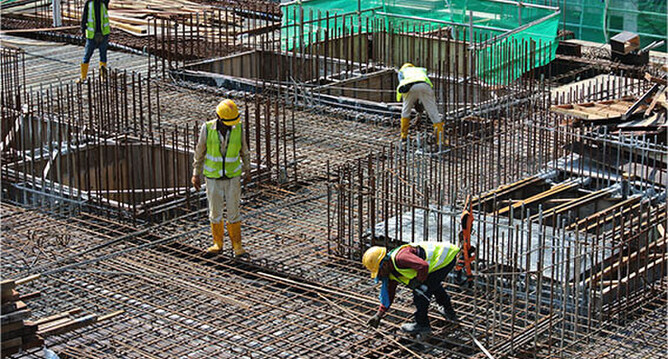The basement construction types in commercial buildings play a pivotal role in determining a building’s longevity, functionality, and cost efficiency. Modern businesses demand reliable, practical spaces that meet the needs of growing industries while offering long-term durability.
Choosing the right basement construction method is key to guaranteeing optimal use of space, minimizing maintenance needs, and providing structural stability. Let's explore the various basement construction types that best suit the needs of contemporary commercial projects, covering their benefits and unique features.
10 Basement Construction Types
Concrete Basements
Concrete basements stand out as one of the most popular choices for commercial buildings due to their durability and practicality. Concrete's strength makes it highly resistant to various weather conditions. Therefore, concrete basements are ideal for businesses that require a strong, secure base for storage or operations.
Concrete construction also offers high resistance to fire, pests, and moisture, which further enhances its value. Additionally, these basements are low maintenance. This provides businesses with a cost-effective solution for long-term use. Concrete basements also provide excellent insulation, improving energy efficiency.
Steel Frame Basements
Steel frame basements offer a reliable and robust foundation for commercial buildings. The strength of steel makes it ideal for supporting large loads–important for buildings with multiple floors or high-density use. Steel frames allow for quick and easy construction. This will reduce the overall timeline of commercial projects.
They also provide flexibility for customization and allow architects to design spaces that maximize the building’s functionality. These basements require minimal maintenance over time, and steel is highly resistant to various environmental elements.
Precast Concrete Basements
Precast concrete basements offer several advantages for commercial construction projects. These basements are fabricated offsite and then transported to the building location, speeding up the construction process. Precast concrete is known for its high strength and durability. It brings excellent resistance to moisture, fire, and pests.
The modular nature of precast concrete allows for customizable designs. It’s ideal for businesses that need specific spatial configurations. This type of basement construction also guarantees high-quality results, as the precast elements are manufactured under controlled conditions.
Cast-In-Place Concrete Basements
Cast-in-place concrete basements are highly valued for their flexibility and strength. Unlike precast concrete, this construction method involves pouring concrete directly at the site. This allows for more customizable designs. It provides businesses with the ability to adjust to unique site conditions and design preferences.
The poured concrete forms a continuous, seamless structure, which enhances its durability and resistance to water and other environmental factors. It is ideal for businesses looking for a tailored basement design that offers the structural integrity and stability required for modern commercial buildings.
Insulated Concrete Form (ICF) Basements Explained
Insulated Concrete Form (ICF) basements combine the strength of concrete with the insulation properties of foam. The foam forms serve as both the mold for the concrete and as a thermal insulation barrier. This will enhance the energy efficiency of the building.
ICF basements are highly resistant to temperature fluctuations–ideal for businesses in climates that experience extreme temperatures. The insulation provided by ICF also helps to reduce heating and cooling costs.
Additionally, ICF basements offer superior resistance to water, mold, and pests. They are a durable and cost-effective choice for modern commercial properties.
Waterproofing Solutions for Commercial Basement Construction
Waterproofing plays a significant role in the longevity and functionality of commercial basements. Waterproofing solutions prevent water infiltration, which can lead to mold, mildew, and structural damage over time.
Commercial buildings rely on effective waterproofing systems to make sure the basement remains dry and usable for storage or office space. Methods such as exterior membrane systems, internal sealants, and sump pumps are commonly used to keep water at bay. These solutions help protect businesses' assets and maintain a healthy environment within the basement.
Modular Basements for Fast and Efficient Construction
Modular basements are becoming increasingly popular in commercial construction due to their fast and efficient installation process. These basements are built in sections offsite and then assembled at the project location. This helps reduce construction time significantly.
Modular basements offer flexibility in design and allow businesses to customize their spaces while benefiting from a quicker turnaround. The modular approach also maintains high-quality control since the components are manufactured in a controlled environment. The reduced construction time translates to lower costs and allows businesses to begin operations sooner.
Raised Floor Systems for Commercial Basements
Raised floor systems are a practical and effective solution for commercial basements–especially for spaces requiring flexible access to cables, pipes, or other utilities.
The raised floor creates an accessible gap between the ground and the actual floor surface. This allows easy installation and maintenance of mechanical systems. The setup is ideal for office spaces, data centers, or any commercial environment where frequent changes to the infrastructure are necessary.
Raised floor systems also improve air circulation, contributing to the building’s overall energy efficiency. The flexibility of these systems makes them a valuable addition to modern commercial basements.
Underground Parking Facilities for Modern Commercial Basements
Underground parking facilities are increasingly common in modern commercial basement designs–especially in urban areas where space is limited. These basements maximize available land by utilizing the underground space for parking. This leaves the surface area free for other uses such as retail or office spaces.
Underground parking offers businesses a secure and efficient solution to manage employee and customer parking needs. These facilities are designed to be robust, durable, and resistant to environmental factors like moisture and flooding. The added benefit of underground parking enhances the value of commercial properties.
Mixed-Use Commercial Basements for Versatile Spaces
Mixed-use commercial basements offer a versatile solution for businesses that require different functions within the same space. These basements can combine areas for retail, office, storage, and even recreational spaces. They are ideal for businesses with diverse needs.
Mixed-use basements allow property owners to maximize their space and cater to various tenants or business types. The flexible design options help accommodate the specific requirements of different industries.
Choosing the Right Basement Type for Your Business
Budget
Cost analysis and budget allocation play a significant role in selecting the most suitable basement type. Construction costs can vary significantly depending on the type of basement (e.g., full basement, crawl space, or slab).
It’s important to evaluate the total cost, including excavation, materials, and labor, and align these with your available budget.
Usage
Understanding the intended use of the basement helps determine the best structural approach.
A basement intended for storage or mechanical systems may require a different foundation or structural design than a basement used for office space, retail, or other commercial purposes. The planned function will influence factors like ceiling height, insulation, drainage, and access needs.
Climate
The climate can impact the choice of materials and construction techniques for durability. For example, areas prone to flooding or heavy rainfall may need extra waterproofing measures. Meanwhile, colder climates may require deeper foundations to prevent freezing.
Adequate ventilation, insulation, and moisture control are key considerations– depending on the region’s weather conditions.
Space Requirements
Different businesses have different spatial needs. This will influence the basement layout and design. A large-scale commercial enterprise might require an expansive, open floor plan.
On the other hand, smaller businesses might need only a compact, well-organized basement. Evaluating space requirements early makes sure that the design supports workflow, storage, or customer access as needed.
Maximize Your Space with Commercial Construction Services in New York from PE Builders
If you're looking to take your commercial basement to the next level, professional commercial construction services in New York are the key to unlocking the full potential of your space. Our team at PE Builders brings extensive expertise to every project.
As professional construction contractors in New York, we manage each phase of your construction with precision. We provide customized solutions that maximize functionality and aesthetics. This makes sure that your basement serves its purpose for years to come.
Let us bring your commercial space to life – PE Builders handles every detail with the highest level of professionalism. Reach out to us now.

